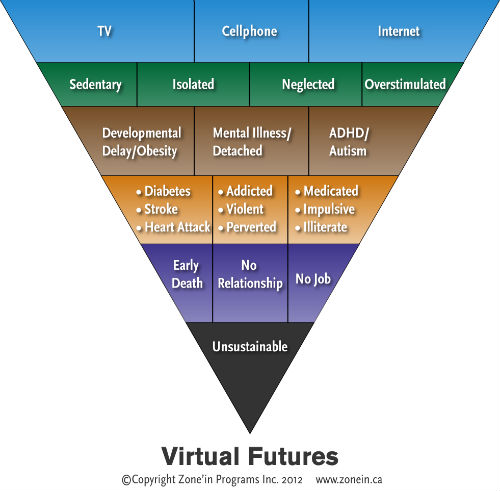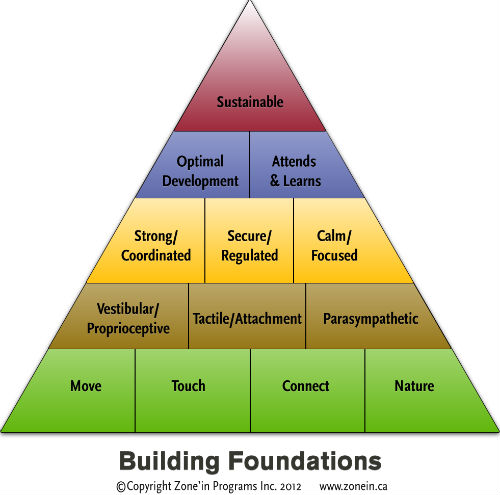 Reminiscing about the good old days when we were growing up is a
memory trip well worth taking when trying to understand the issues
facing the children of today. A mere 20 years ago, children used to play
outside all day, riding bikes, playing sports and building forts.
Masters of imaginary games, children of the past created their own form
of play that didn’t require costly equipment or parental supervision.
Children of the past moved… a lot, and their sensory world was nature
based and simple. In the past, family time was often spent doing chores,
and children had expectations to meet on a daily basis. The dining room
table was a central place where families came together to eat and talk
about their day, and after dinner became the center for baking, crafts
and homework.
Reminiscing about the good old days when we were growing up is a
memory trip well worth taking when trying to understand the issues
facing the children of today. A mere 20 years ago, children used to play
outside all day, riding bikes, playing sports and building forts.
Masters of imaginary games, children of the past created their own form
of play that didn’t require costly equipment or parental supervision.
Children of the past moved… a lot, and their sensory world was nature
based and simple. In the past, family time was often spent doing chores,
and children had expectations to meet on a daily basis. The dining room
table was a central place where families came together to eat and talk
about their day, and after dinner became the center for baking, crafts
and homework.Today’s families are different. Technology’s impact on the 21st century family is fracturing its very foundation, and causing a disintegration of core values that long ago were the fabric that held families together. Juggling school, work, home, and community lives, parents now rely heavily on communication, information, and transportation technology to make their lives faster and more efficient. Entertainment technology (TV, Internet, video games, iPads, cell phones) has advanced so rapidly, that families have scarcely noticed the significant impact and changes to their family structure and lifestyles. A 2010 Kaiser Foundation study showed that elementary aged children use on average 7.5 hours per day of entertainment technology, 75 percent of these children have TV’s in their bedrooms, and 50 percent of North American homes have the TV on all day. Gone is dining room table conversation, replaced by the “big screen” and take out.
Children now rely on technology for the majority of their play, grossly limiting challenges to their creativity and imaginations, as well as limiting necessary challenges to their bodies to achieve optimal sensory and motor development. Sedentary bodies bombarded with chaotic sensory stimulation are resulting in delays in attaining child developmental milestones, with subsequent negative impact on basic foundation skills for achieving literacy. Hard-wired for high speed, today’s young are entering school struggling with self regulation and attention skills necessary for learning, eventually becoming significant behavior management problems for teachers in the classroom.
So what is the impact of technology on the developing child? Children’s developing sensory, motor, and attachment systems have biologically not evolved to accommodate this sedentary, yet frenzied and chaotic nature of today’s technology. The impact of rapidly advancing technology on the developing child has seen an increase of physical, psychological and behavior disorders that the health and education systems are just beginning to detect, much less understand. Child obesity and diabetes are now national epidemics in both Canada and the U.S., causally related to technology overuse. Diagnoses of ADHD, autism, coordination disorder, developmental delays, unintelligible speech, learning difficulties, sensory processing disorder, anxiety, depression, and sleep disorders are associated with technology overuse, and are increasing at an alarming rate. An urgent closer look at the critical factors for meeting developmental milestones, and the subsequent impact of technology on those factors, would assist parents, teachers and health professionals to better understand the complexities of this issue, and help create effective strategies to reduce technology use.

Further analysis of the impact of technology on the developing child
indicates that while the vestibular, proprioceptive, tactile and
attachment systems are under stimulated, the visual and auditory sensory
systems are in “overload.” This sensory imbalance creates huge problems
in overall neurological development, as the brain’s anatomy, chemistry
and pathways become permanently altered and impaired. Young children who
are exposed to violence through TV and video games are in a high state
of adrenalin and stress, as the body does not know that what they are
watching is not real. Children who overuse technology report persistent
body sensations of overall “shaking”, increased breathing and heart
rate, and a general state of “unease.” This can best be described as a
persistent hypervigalent sensory system, still “on alert” for the
oncoming assault. While the long term effects of this chronic state of
stress in the developing child are unknown, we do know that chronic
stress in adults results in a weakened immune system and a variety of
serious diseases and disorders.

It’s important to come together as parents, teachers and therapists to help society “wake up” and see the devastating effects technology is having not only on our child’s physical, psychological and behavioral health, but also on their ability to learn and sustain personal and family relationships. While technology is a train that will continually move forward, knowledge regarding its detrimental effects, and action taken toward balancing the use of technology with critical factors for development, will work toward sustaining our children. While no one can argue the benefits of advanced technology in today’s world, connection to these devices may have resulted in a disconnection from what society should value most, children. Rather than hugging, playing, rough housing, and conversing with children, parents are increasingly resorting to providing their children with more TV, video games, and the latest iPads and cell phone devices, creating a deep and irreversible chasm between parent and child.
A frequent guest on CBC radio, TV, and featured in CBC TV’s Doc Zone documentary “Are We Digital Dummies”, Cris Rowan speaks passionately about how technology is eroding children’s foundations for development and learning. Cris Rowan is a pediatric occupational therapist who has witnessed dramatic changes how children play, resulting in rising levels of obesity, developmental delay and mental disorders. Cris has first-hand understanding and knowledge of how technology has caused profound changes in a child’s development, behavior and their ability to learn. Cris is CEO of Zone’in Programs Inc. offering products, workshops and training to improve child health and enhance academic performance. Cris designed Zone’in, Move’in, Unplug’in and Live’in educational products for elementary children to address the rise in developmental delays, behavior disorders, and technology overuse. Cris has performed over 200 Foundation Series Workshops on topics such as sensory integration and attention, motor development and literacy, attachment formation and addictions, early intervention, technology overuse, media literacy programs, and school environmental design for the 21st century for teachers, parents and health professionals throughout North America.
By Cris Rowan, Pediatric Occupational Therapist
Learn more about Cris’ work at http://www.zonein.ca/
This article originally appeared in the Huffington Post.
Republished from Waldorf Today.

1 comment:
Great post. This article is really very interesting and effective. I think its must be helpful for us. Thanks for your nice post.
social exchange sites
Post a Comment